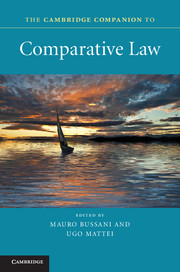Book contents
- Frontmatter
- Contents
- Contributors
- Abbreviations
- Preface
- Part I Knowing comparative law
- Part II Comparative law fields
- 6 Comparative studies in private law
- 7 Comparative administrative law
- 8 Comparative constitutional law
- 9 Comparative criminal justice
- 10 Comparative civil justice
- 11 Comparative law and international organizations
- Part III Comparative law in the flux of civilizations
- Index
- References
10 - Comparative civil justice
Published online by Cambridge University Press: 05 May 2013
- Frontmatter
- Contents
- Contributors
- Abbreviations
- Preface
- Part I Knowing comparative law
- Part II Comparative law fields
- 6 Comparative studies in private law
- 7 Comparative administrative law
- 8 Comparative constitutional law
- 9 Comparative criminal justice
- 10 Comparative civil justice
- 11 Comparative law and international organizations
- Part III Comparative law in the flux of civilizations
- Index
- References
Summary
Introduction
The civil justice system of every modern state presents a tapestry of intertwined threads. The resulting image reflects the laws providing for redress of selected grievances, the remedies available to the aggrieved parties, the institutions available for resolving disputes, and the processes followed by those institutions. All of these are informed by the fundamental elements of the society – its political system, its economic arrangements, and its culture. In this chapter we are concerned primarily with dispute-processing institutions. All modern states have established judicial systems designed to accomplish the basic tasks of finding the relevant law and applying it in an efficient and fair manner to the actual facts underlying the dispute. The differences among them are about how to achieve these goals. We shall describe significant features of modern systems, discuss the difficulties of categorizing them, and try to account for the differences among them by looking at broader issues of politics, culture, and history. We close with some observations about the future of procedure in an ever-globalizing world and of the challenges for procedural comparatists.
Before we parse the varieties of disputing in the modern world, we alert the reader to the tunnel-vision dangers of assuming that ‘official’ dispute institutions tell the whole story. Even in the most ‘officialized’ countries, informal systems, usually grouped under the catch-all heading of alternative dispute resolution or ‘ADR’, supplement the formal, court-based processes. Still more is this the case in those societies that have yet to succumb completely to modernity. As Werner Menski powerfully reminds us, large groups of people are still at least partially, or even predominantly, oriented towards traditional ways of thought and living. Taking a different path, H. Patrick Glenn argues that the informal law of the less developed world (what he calls ‘chthonic’ law) is but one of several – perhaps many – legal traditions, including the Talmudic, Islamic, Hindu, civil law, and common law. The dispute processes, or ‘civil justice’ (as we might call it) of each of these traditions largely mirror the world views of those who are steeped in them.
- Type
- Chapter
- Information
- The Cambridge Companion to Comparative Law , pp. 210 - 240Publisher: Cambridge University PressPrint publication year: 2012
References
- 1
- Cited by



